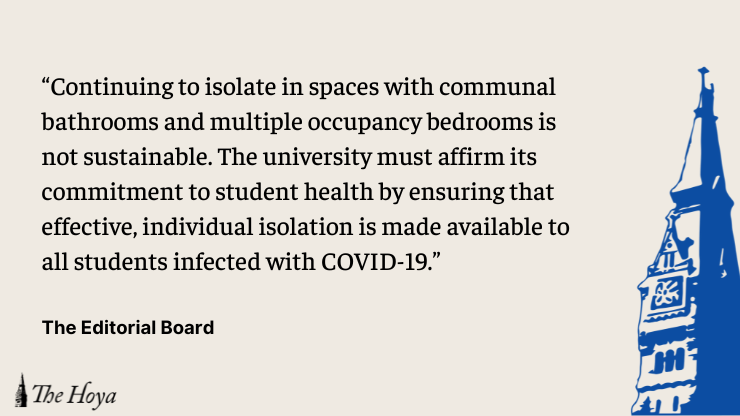Simply put, we are not in a post-COVID-19 pandemic world.
Since Aug. 1, Georgetown University has tracked 409 reported cases of COVID-19. However, this number is likely an underestimate, according to Ranit Mishori, the university’s vice president and chief public health officer.
Amid relaxed COVID-19 response, the Editorial Board calls on Georgetown to provide funding for private isolation in hotels or search for new isolation spaces on campus.
Last year, the university relocated students who tested positive for COVID-19 temporarily to the Georgetown University Hotel and Conference Center to isolate them for the duration of their quarantine.
However, due to the knockdown and reconstruction of Henle Village this summer, the university converted the hotel to student housing. As a result, there is no longer a designated isolation location for students with COVID-19, and thus far, Georgetown has not offered an alternative quarantine spot.
Currently, Georgetown policy states that infected students must isolate themselves in their dormitories and wear an N-95 mask whenever around others in their residence.
Despite this advice, quarantining in one’s own bedroom is complicated immensely by the presence of a roommate.
For students living in double or even triple occupancy dormitories, such as New South Hall, Harbin Hall, Darnall Hall, the Southwest Quadrangle and Village C East and West, all the beds are in one room. Therefore, if one roommate is sick, the other(s) must continue living in direct contact with the infected student.
Emily Taylor (CAS ’25) expressed her concern that isolation in double and triple occupancy dormitories, especially for first-years, will be unable to prevent the spread of COVID-19.
“Especially for people in underclassmen dorms, where it is hard to isolate, it will
actually increase the spread of illness. It is also unfair to roommates to uproot their entire
lives,” Taylor said to The Hoya.
The university provides no clear guidance on how students who are unable to close a door in their dormitory should isolate themselves from uninfected roommates.
This issue is especially challenging if an uninfected roommate is immunocompromised.
According to Mishori, Georgetown is cooperating with these students on a case-by-case basis but has no standard policy for students with very real health consequences if they were to contract COVID-19.
Chris LoPresti (CAS ’25) said that the isolation housing crisis will only get worse.
“What happens when there’s a massive spike of cases on campus? It will be a free-for-all of students trying to find a friend’s couch to sleep on, or worse, forced to sleep in their room with someone who has COVID because Georgetown doesn’t provide any isolation housing,” LoPresti wrote to The Hoya.
“I’d like to give Georgetown the benefit of the doubt because I know there’s an extremely hard-working staff and Henle was torn down,” LoPresti added. “But there should be serious concerns about the policies in place.”
Currently, there is no specific policy in place for students whose roommates contract COVID-19. The university only advises that those exposed to COVID-19 get tested five days later and wear a mask for 10 days after the initial contact.
The Editorial Board recommends that the university reconsider its isolation policy by looking for alternative isolation places on campus or funding off-campus isolation for infected students.
Furthermore, for students living in dormitories with communal bathrooms, such as Harbin Hall and Darnall Hall, the threat of contamination and COVID-19 spread is only exacerbated.
Mishori recommends that infected students refrain from using the bathroom while others are present, but this is challenging to follow in residences with shared bathrooms.
The issue with communal bathrooms further underscores the need for Georgetown to provide individual, isolated housing for quarantining students. The Editorial Board calls upon the university to update its isolation policy to create individual quarantine spaces either on-campus or off-campus.
Continuing to isolate in locations with communal bathrooms and multiple occupancy bedrooms is not sustainable. The university must affirm its commitment to student health by ensuring that effective, individual isolation is made available to all students infected with COVID-19.
As COVID-19 continues to spread, Georgetown must prioritize a reform of its isolation policies to prioritize the physical health of all students.
The Hoya’s Editorial Board is composed of six students and is chaired by the opinion editors. Editorials reflect only the beliefs of a majority of the board and are not representative of The Hoya or any individual member of the board.














